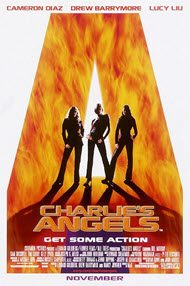Charlie's Angels
 for action violence, innuendo and some sensuality/nudity.
for action violence, innuendo and some sensuality/nudity.
Reviewed by: Curtis D. Smith
CONTRIBUTOR
| Moral Rating: | Very Offensive |
| Moviemaking Quality: |
|
| Primary Audience: | Adults |
| Genre: | Action Comedy |
| Length: | 1 hr. 38 min. |
| Year of Release: | 2000 |
| USA Release: |
November 3, 2000 (wide release) |
| Featuring |
Drew Barrymore Cameron Diaz Lucy Liu Bill Murray Sam Rockwell |
| Director |
Joseph McGinty McG |
| Producer | Drew Barrymore, Leonard J. Goldberg, Leonard Goldberg, Nancy Juvonen |
| Distributor |
Franchise: “Charlie's Angels: Full Throttle” (2003), “Charlie’s Angel's” (2019)
After years of anonymity, will a diabolical plot to kill the millionaire founder of the Townsend Detective Agency allow the angels a chance to finally meet their wealthy boss?
Well, yes and no. Most of us don’t care and the rest can probably wait until the video release to find out, but those who dare to wager $8 will see an action packed “update” of the popular Aaron Spelling produced TV series of the late 70s called “Charlie’s Angels”.
 An original yet morally questionable hit that launched the erratic acting careers of Farrah Fawcett, Kate Jackson and Jaclyn Smith (and later, Cheryl Ladd, Tanya Roberts and Shelley Hack), “Charlie’s Angels” offered viewers a new societal look at the world’s modern woman through today’s opaque eyes of action, adventure and comedy.
An original yet morally questionable hit that launched the erratic acting careers of Farrah Fawcett, Kate Jackson and Jaclyn Smith (and later, Cheryl Ladd, Tanya Roberts and Shelley Hack), “Charlie’s Angels” offered viewers a new societal look at the world’s modern woman through today’s opaque eyes of action, adventure and comedy.
This latest installment—called an update by its producers—takes that look where the franchise might be today had it kept going. But more than just an update, the 2000 version is really a would-be spoof of the former TV show that makes fun of itself through cartoonish violence, blatant sexual innuendo, hair-flipping references to the 1970s and silly-looking feats of agility. It’s Jackie Chan meets MTV, “The Matrix” meets “Austin Powers” or a mixture of “Mission: Impossible 2” and just about any James Bond film.
Angels Natalie (Cameron Diaz), Dylan (Drew Barrymore) and Alex (Lucy Liu) are assigned by Charlie (voice of John Forsythe) to rescue a kidnapped software engineer (Sam Rockwell) responsible for creating a prolific voice-identification program believed stolen by corporate rival Roger Corwin (Tim Curry). When the angels liberate the engineer and infiltrate Red Star Systems to find the software they are suddenly thrust into a plot to locate and destroy their beloved boss.
Meanwhile, the new Bosley (Bill Murray) introduces the angels to Vivian Wood (Kelly Lynch), the software company’s dubious president, who seems a little too eager to tap into Corwin’s Red Star satellite system. Turns out she and her unsavory cohorts plan to use the software and accompanying global satellite system to exact revenge against Charlie for an alleged crime he committed in the military years ago.
One very important issue to remember here is that the nondescript plot cannot stand in the way of this movie, that is, if you plan to sit through the whole thing with all your brain cells intact. The action, comedy and visual prowess of the film is what gives it its occasional vigor, not great acting or a clever story. However, constant sexual overtones make this “sexploitation” film nearly impossible to watch without adjusting one’s moral compass beyond the safety zone.
A precariously demoralizing worldview of young women prevails in “Charlie’s Angels”. It repeatedly says women are little more than sexual playthings—with few brains and even fewer inhibitions—who must prance around half naked in order to get what they want. First John 2:16-17 tells us: “For all that is in the world, the lust of the flesh and the lust of the eyes and the boastful pride of life, is not from the Father, but it is from the world. And the world is passing away, and also its lusts; but the one who does the will of God abides forever.” While most of the film offers what the world sees as benign humor, much of it is laced with erotic imagery and dialogue designed to evoke sensuality where none needs to exist.
Furthermore, several choreographed fight scenes featuring the girls and a hired gun (Crispin Glover) are apparently aimed at exhibiting female empowerment, but they instead might send mixed signals to young viewers about the call for violence—a fight producer/actor Barrymore claims to champion.
Directed by music video veteran McG, “Charlie’s Angels” is quite frankly little more than a tasteless visual experience. When the angels do happen to stop for an infrequent break from the mission their dialogue is cheesy and wrought with sexual double entendre.
An underutilized Murray adds some validity to the comedic tone of the film with his typical dry humor and wit. Unlike the original Bosley in many ways (who was played by the late David Doyle), Murray’s character gets involved with the operation long enough to be captured by the baddies and taken to their hidden fortress where they plan the demise of Charlie’s crime fighting team.
It’s hard to imagine who the target audience might be other than depraved teen boys because the film’s subject matter and intelligence is so vapid—truly it’s an equal opportunity abuser of intellect. And just when you think some wit might escape the lips of one of the lead actresses at some point during the film they instead open their mouths to spew more horrid idiocy written by screenwriters Ryan Rowe, Ed Solomon and John August.
But McG (that name!) deserves all the credit and/or blame for “Charlie’s Angels.” What he’s created, once you get right down to it, is 92 minutes of sexually charged brainless eye candy that shamelessly borrows from just about every Hong Kong action movie made in the last two years. Sadly, the “Charlie’s Angels” poster logo says just about everything the filmmakers wish to say about their effort: “Get Some Action.” Don’t get me wrong, Charlie’s Angels is a funny and fast paced film that promises lots of thrills, but it seems our Lord likely intended there to be much more to a woman than her outward appearance and attitude. Unfortunately, womankind loses more moral ground than it takes with “Charlie’s Angels.”


There was some swearing in the Lord’s name (not good of course). Also, Natalie (Diaz) was always wearing very short skirts and shaking her bum every time she dances. Although that is shown more as a playful thing, not a sexual turn on, its quite disturbing. Also, Drew (Dylan) was wearing a very VERY low cut shirt (quite disturbing). Not to mention that Drew also had countless one night stands. One of the only moral parts was when Natalie said (after vivian wood “interrupted” her talk with bf), “Do you know how hard it is to find quality guys in Los Angeles?”. That is definitely true. It’s also quite hard to find quality movies in Hollywood. [2/3½]



